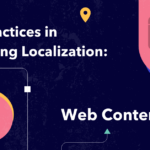Speed to market is crucial for businesses looking to expand into new markets, however, language barriers and translation challenges can prove to be a hurdle during this process. Translation efficiency plays a vital role in overcoming these obstacles and enabling businesses to enter new markets quickly.
That said, when you leverage innovative technologies like machine translation, automation, and workflow optimization, you can streamline your translation processes, enhance localization efforts, and deliver high-quality translated content. But what are the key factors that affect translation efficiency, and how does solving these issues contribute to a competitive advantage in global markets?
What Affects Translation Efficiency?
Scale and complexity have a major impact on the efficiency of translation and as they expand, the volume of required content translation also increases. Efficient translation management systems and workflow optimization are necessary to handle large-scale translation projects effectively. In addition, c content, such as technical or legal documents, requires specialized knowledge and expertise. Employing professional translators with subject matter expertise ensures accurate translations and efficient communication with target audiences.
In fact, in an effort to improve translation efficiencies, TechSmith leveraged multilingual customer service to 100+ countries through Unbabel, resulting in faster response times as any agent could handle multilingual tickets within 30 minutes. Additionally, productivity increased as agents efficiently managed demand in 15 languages and recruitment costs decreased as a result of prioritizing skilled technical support over native-speaking agents.
Automation and technology also play major roles in translation efficiency. MT and translation memory technologies streamline the translation process by automatically translating repetitive and previously translated content while computer-assisted tools (CAT) tools and neural machine translation (NMT) algorithms help translators work more efficiently, improving turnaround times and maintaining consistency.
As an example, Photobox uses a seamless process through Unbabel to deliver first-rate translation through automation and technology — leading to improved collaboration, increased automation, faster deployment, and reduced costs and risks. better overview, simplified budget management, easier governance, and bolstered team collaboration.
Finally, localization and cultural adaptation significantly affect translation efficiency. Localization goes beyond translation and involves adapting content to resonate with the target market’s cultural nuances and preferences. Systems that employ native speakers and cultural experts ensure accurate localization and improved customer engagement.
Unbabel customer, Eventbrite delivers continuous software localization for all its target markets by translating over a million words in multiple languages that cover website content, user interface, apps, help center articles, and buyer guides. The system integrations remove the need to export files for translation, which simplifies the localization process.
So, why is translation vital to your growth?
1. It helps you break through language barriers
Translating marketing materials, product descriptions, and website content into the local language allows you to engage and communicate effectively with your target audience, build brand perception, and foster customer loyalty. Social media marketing messages also benefit from translation, allowing you to reach a broader audience and connect with potential customers worldwide. In addition, localization ensures that your marketing strategies are tailored to specific regions, improving customer experience and driving revenue growth.
2. It enables compliance with cross-border laws and regulations
Expanding into new markets requires businesses to comply with local laws and regulations, including language requirements. For example, in Canada and Quebec, where French is prominent, businesses must navigate specific language regulations.
Quebec’s Charter of the French Language establishes French as the official language and sets regulations for commercial activities. To ensure compliance, businesses must translate marketing materials, product labels, and customer communications into French, and partnering with professional translation service providers experienced in these markets is key. Adhering to language regulations is vital for efficient translation processes and the overall growth and success of businesses entering global markets.
3. It supports cultural adaptation
Translation plays a crucial role in cultural adaptation, which is necessary for business growth in new markets, as businesses should strive to go beyond literal translation and adapt your content to resonate with the local culture and preferences. Accurate translation ensures that your marketing messages, product descriptions, and other content are culturally relevant and engaging for the target audience.
Embracing cultural adaptation through translation, you demonstrate respect for local customs, values, and linguistic nuances, thereby creating stronger connections with customers — This, in turn, enhances brand perception, increases customer trust, and drives business growth in diverse markets. In fact, ClassPass was able to expand across 30 countries in 15 languages with customer service satisfaction scores on translated tickets comparable to those from English speakers.
4. It boosts international SEO
Translation can serve to boost international SEO, providing a competitive advantage. By implementing a well-executed translation marketing strategy, you can tap into untapped markets and enable the rapid delivery of localized and culturally adapted content, helping you surpass competitors who struggle with language barriers. Speedy translation facilitates simultaneous product launches and marketing campaigns across multiple markets, which reduces time to market and maximizes revenue potential.
When you embrace efficient translation workflows, and automation, alongside machine learning and translation you can stay ahead in the fast-paced business landscape, enhancing your visibility and reach in global markets.
Empower business growth through efficient translation
Unbabel offers an effective approach to improving translation efficiency, which is crucial for businesses aiming to access new markets. Our machine translation and quality estimation technologies, coupled with exceptional customer service capabilities, ensure high-quality translations.
With Unbabel, you can enhance translation quality, accelerate speed to market, and overcome language barriers. Unbabel’s approach includes cost-effectiveness, scalability, and the ability to adapt content to diverse markets.
To witness the power of efficient translation firsthand, see an Unbabel demo today.
If you’re ready to accelerate your translation processes and expand into new markets, sign up for a free trial of Unbabel today.












